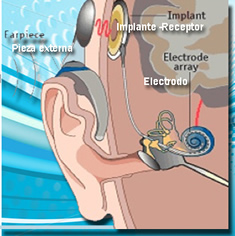....Implant Technology ....Help Dolli Stay in the Conversation
PAMELA B. SMITH, Dolli Cutler was in her 30s when it became clear she might have a problem hearing. She was working for the Administration on Aging in Washington, D.C., and her boss was frank in telling her that she was missing information in meetings. Unlike her father who ignored pleas from his family to do something about his hearing, Dolli took action. She was diagnosed as having mild to moderate hearing loss in 1974. An audiologist fitted her first hearing aid. Dolli’s hearing loss progressed only gradually until about 10 years ago, when her ability to hear clearly fell dramatically. “I was beginning to withdraw from the world,” she admits. After volunteering for several years on the AIS Advisory Council, she was thinking of dropping out. Not because she didn’t love the work being done, but because she was missing information in meetings again. For that same reason, she was thinking about ending her participation in two book clubs. “I was beginning to become one of the isolated seniors we (at AIS) try to help,” she says. Not knowing much about implants, Dolli found a blog on the Internet where she could chat with people who had already had the surgery. She asked a lot of questions. She also found out she could get coverage for the surgery from Medicare and Kaiser, her health plan. In 2008, she decided to see if she was a candidate for the procedure. “It’s major surgery, even though it’s an outpatient procedure, and you have to qualify,” she says. “You have to go through tests, including an MRI, balance test, even a psychological evaluation before they OK you for surgery.” An implant includes an array of electrodes inserted in the cochlear, or inner ear. Electrical signals from the electrodes stimulate the hearing nerve, bypassing the damaged hair cells that result in hearing loss. The electrical signals allow the brain to perceive sound. It has been about a year and a half since Dolli had her surgery and she feels as if the implants have given her her life back: “It’s 100 times more powerful than my hearing aids. “It’s really exciting. I feel so much more connected, more involved in conversations. My sister was so used to my being hard of hearing that she hasn’t stopped asking, ‘Did you hear me?’ and I tell her that of course I did. I can hear conversations going on in the front of the car when I’m in the back. I could never do that before.” Along with the implanted part of the device is an outside microphone and speech processor that attach by magnets behind Dolli’s ears. She is able to adjust the device for different sound environments. “If I’m at a party, there’s a setting labeled ‘Noise’ and that allows me to hear the people closest to me, but it knocks down background noise,” she says. “In very crowded situations, it can be difficult still, but you work with it. I’ve been to loud parties and was still able to have good conversations.” What’s exciting for her is that her hearing will stay this good or get better, and not decline as she had been used to. She says she does an “oral rehab” program four times a week where she listens to sounds in different settings and “I’ve always found that I hear better after doing these exercises.” Not only was Dolli able to retain the volunteer activities she enjoys, including working with the Balboa Park Visitor’s Center, but she has become more active. She helped start a San Diego chapter of the Hearing Loss Association of America. She encourages people who don’t even have a hearing aid but who notice a problem to attend one of the meetings and learn about resources and options. •The San Diego chapter meets from 10 a.m. to noon on the third Saturday of each month at LiveWell San Diego, 4425 Bannock Ave., San Diego 92117. The Hearing Loss Association of America website: www.hearingloss.org Many people with profound hearing loss have enjoyed improved quality of life through the use of cochlear-implant-technology. With advancements in technology and continued follow-up studies with people who already have received implants, researchers are evaluating how cochlear implants might be used for other types of hearing loss. Need More Information? • http://www.healthyhearing.com • Sound from Silence - Cochlear Implant Technology
|
|
|
|
 info
info
The first, the best & the only English & Spanish Magazine in San Diego, California
|
Hearing problem? You are not alone The National Institute on Aging estimates that about one-third of Americans between ages 65 and 74 have hearing difficulty — and that number increases to 50 percent in people 85 and older. In about 10% of the elderly, the impairment is so severe that conventional hearing aids provide little benefit. The inability to communicate interferes greatly with daily living and can lead to cognitive impairment, personality changes, depression, reduced functional status and social isolation. |
Technology Helps to |
...Information, Assistance, Programs, Advocacy and Resources for Elderly and their Family Caregivers |
|
|
|
|
|
|
|
|
|
|
|
|
|
|
|



 implants.
implants.